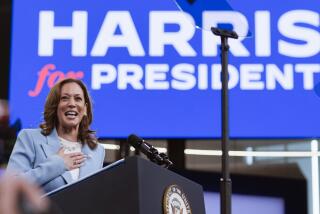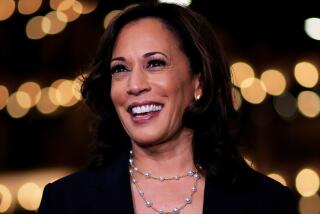Commission to rethink primaries
- Share via
DENVER — Democrats moved Saturday to change the way they nominate presidential candidates and avoid a repeat of this year’s primary scramble. But they shied away from substantive debate on issues such as whether to take away Iowa’s and New Hampshire’s jealously guarded status as the nation’s first vetting grounds for presidential candidates.
As a rules panel within the Democratic National Convention Committee voted unanimously to start talking about how to prevent a jammed primary schedule, party leaders sought to put off substantive, and divisive, talk on the subject until after this year’s campaign.
“No state was left behind in the primaries,” Democratic Party Chairman Howard Dean told the panel. He said earlier this month that the party needed to review its primary and caucus rules and reduce the number of superdelegates.
There appears to be broad consensus among Democrats that the nomination process needs to be reformed in light of this year’s seismic battle between Sen. Hillary Rodham Clinton and presumed nominee Sen. Barack Obama.
But Democrats who set up a commission to review the process said it was unlikely to look at the states that now have early caucuses and primaries.
“Everybody sees a real need for us to reform the way we do this,” said former South Carolina Gov. Jim Hodges, who introduced a plan Saturday to examine the schedule. But Hodges added that his state’s status as one of the earliest to choose a nominee would not change.
“The first four states, those aren’t going anywhere,” Hodges told reporters, referring to Iowa, New Hampshire, South Carolina and Nevada.
Even representatives from large and diverse states where Democrats have complained that they don’t have enough say over the nomination process conceded that Iowa and New Hampshire have little to fear from the reform effort.
“It’s such an emotional issue in those states that it’s very unlikely that’s going to change,” said Steven Schatz, a party activist from Atherton, Calif., who is a member of the rules committee, which approved the commission. “There are certain traditions in politics that are hard to disturb.”
More pressing, Democrats said, is to review the role of superdelegates. A mystery to most Americans until this year, superdelegates are party insiders and elected officials who can vote for whomever they choose for president, regardless of who wins their state. The proposal to form the commission included a pledge to cut the number of superdelegates.
“This year, superdelegates comprised 20% of our national delegation. Yet the vast majority of the public had no idea what superdelegates were until this year,” said Michael B. Coleman, mayor of Columbus, Ohio, a committee member and a convention delegate. “The role they played in our nominating process actually distracted us from the important issues we were debating.”
The commission also will review caucuses, which were deftly maneuvered by Obama to counter large-state victories by Clinton. Several Democrats who met Saturday said that caucuses need to be more inclusive and that the party should require the same voter access measures in place during general elections, such as secret ballots and absentee voting.
Changes in the nomination process are to be proposed by 2010 and in place by the 2012 presidential contest.
More to Read
Get the L.A. Times Politics newsletter
Deeply reported insights into legislation, politics and policy from Sacramento, Washington and beyond. In your inbox twice per week.
You may occasionally receive promotional content from the Los Angeles Times.










